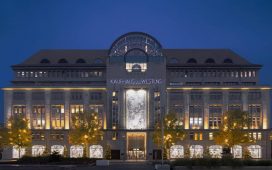Chatting on a muggy day in London, when Rose Williams informs me that, “the makeup has melted off my face,” its highly evident we are a million miles – or rather years – away from the glamour of her first leading role in Sanditon. The latest Jane Austen adaption, set in a new British Coastal down, has served Rose Williams her first leading role as Charlotte Heywood, whose story was incomplete upon the author’s death.

Watching Rose command the screen in ITV’s period drama, it’s easy to see why she was cast. Despite this being a time of constriction for women in many ways – but physically and metaphorically – Rose breathes a new feminist air into the character. Step forth a strong independent women of Destiny’s Child proportions, who despite being greeted by numerous suitors – mainly by the name of Theo James who even bares his bum on the beach of Sanditon – she is more interested in her career than marriage. FINALLY.
The developments don’t stop there as in the hands of Andrew Davies, who recently refashioned Les Misérables for BBC One, the show is more representative of the world we actually live in. Alongside Rose’s Charlotte is Miss Lambe, a black heiress who becomes one of the show’s prominent heroines.
Here, Rose Williams discusses her unstoppable rise from a Super Noodle diet to Jane Austen, why this is a period drama for 2019, how her character helped her to realise the power of her own voice and her own personal costumes drama…
The ‘representation’ in Sanditon is so powerful and so needed – what kind of changes do you want to see in representation?
I saw the script and I asked if it was an all-white cast. If it was it would have given me a twinge as it’s not historically accurate and not relevant to have an all-white cast in a period drama. It’s actually very untruthful! There is a lot of retelling needed and characters like Lady Lambe did exist. Jane Austen actually wrote the character about an heiress from Antigua. So, when I saw that in the script I thought, ‘I am in!’ There is a lot of ground to be covered when it comes to representation in period dramas and that is why I absolutely love the character of Miss Lambe. Because really, she’s the most elegant character and Charlotte is ignorant to her history which was really important to me for her to be seen as ignorant. She is a character from the countryside and no idea about the turmoil and strife outside of the bubble. I really hope it comes across that she is educated by this young elegant Antiguan woman.
What have you learnt the most about yourself through playing Charlotte in Sanditon?
I learnt so much! Charlotte uses her voice throughout the series especially in the second episode when she’s confronted about her opinions on marriage and she says, ‘I am not interested in marriage and if I was wealth wouldn’t come into it.’ Playing a part where she speaks her mind in such a way and has a confidence about her made me find my voice a little bit more, too. It’s my first leading role so it required a lot from me. It felt like it fell out of the sky. I found out about it on the Friday, sent a tape for it on Sunday and Monday I had the part! It really was heaven set. I started filming on my 25th birthday too so that felt really meaningful. I hadn’t explored Jane Austen’s work before in depth, and I am glad I explored her writing later in life as I had more life experiences to understand the scope of her message and legacy. It really felt like a deep learning experience from start to end and continues to be. Work wise I have never been in most scenes in episodes. I was used to dipping in and out. So that I felt more part of the team with the crew which was a lovely experience as they just felt like family.

It’s such a constraining time for women but the way you play Charlotte breathes life and freedom in the character. How did you shape her into a feminist character?
I just really tried to relate her to me and my life to. And also, how I felt as a young girl and relate it to real emotions. I watched all the Jane Austen adaptions beforehand to get a real feel for it so I suppose I tried to stay in the moment and the feelings of it all as best I could. I was encouraged by our director to just be myself. We wanted to make it a dynamic period drama that felt modern and fresh. We talked a lot about the comparisons between then and now. It was quite a chaotic time, with tabloid papers and scandals in politics and new businessmen coming to the forefront. They wanted to set up the show that was relatable to now but also to tropes we know and love as a nation.
How did you relate to Charlotte?
There is a direct correlation between us in that we are both more interested in work than romance and prioritising that. It’s like in the Devil Wears Prada when Stanley Tucci says, “being passionate about work!” In the past sometimes the way she is quite bold and doesn’t think before she does things and there moments in my past, I would do that too!

What do you think Sanditon shows about how far the plight of women has come and how far we still have left to go?
It’s full of juxtapositions. For instance, all women in this period wore corsets. They make you stand differently and take you to a different place. But they are so uncomfortable and so constricting and the clothes over the top are very flowy. You wouldn’t know looking at the flowy, Grecian inspired dresses at the time that the level of constraint was there. There’s this contrast of constriction and freedom which echoes our time today. For example, there is movement, conversations are being had, certain behaviours are not being accepted but equally there is a long way to go. There have been changes but you can’t change patriarchy in a year- it’s so engrained. Charlotte has a lot of freedom and the producers were pushing for her to be strong and solidify the fact she’s a strong woman. But women couldn’t sign contracts or have their own money if they were married so it was interesting to put myself in that mental space. There are comparisons between society then and now that weirdly reflect each other.
What do you think is the most pressing issue for young women in the entertainment industry today?
A lot has changed. If I came into the industry now it would be a completely different experience to 6 years ago when I started out. The pressure on appearance has lessened, casting brackets have opened up. There are shows like Pose being made and Euphoria. There have always been an audience for shows like that, but they just weren’t given the green light until now. Also, a tangible thing is that in auditions the first three words about a part used to be about appearance. It would be normally Caucasian. Now 90 percent of the time it leaves the ethnicity open. It used to read: pretty, athletic, girl next door, slim and very specific about appearance-based adjectives. Seeing that change is great. The past three characters I have played are strong and wonderfully written.

Charlotte is investigating her own independence for the first time. Can you remember a game changing moment in your own independence and your ‘adulting experience’?
My first proper job was at clothes shop in Dover Street Market when I was 17 years old. When I paid my first bills in my own flat at 18 years old was a big moment for me. But I was also eating pound shop food and super noodles. I also remember eating frozen jacket potatoes you would heat in the microwave. I had a terrible diet because I didn’t have much money, but I had a real satisfaction by paying my bills with my own money. When I paid my water and electricity bill I felt like a real adult!
Charlotte is completely displaced from her surroundings and where she grew up. Can you remember a time you felt displaced and how you overcame it?
I still feel like that to this day with different jobs. I just deal with it in different ways. I love to travel, and I love the challenges, I can’t see myself doing anything in one fixed place. The first time I felt it was when I was doing a show called Reign which was shot in Toronto. I got the job and it was for three episodes with the intention of doing more. In my head I was there for one month. But they decided to keep me on as a regular character. I was 20 years old and that was a big thing for me. It was pure joy and luck but also adjusting to being in a different country. It really made me who I am, and you need to count your blessings. I just got a tattoo on my wrist that says ‘gratitude.’ Any moment I feel wobbly about something I look at that tattoo and think, ‘No! It’s really amazing you get to do this as a job!’ It was to keep me in check.

As this is your first leading role how do you cope with pressure?
I was surrounded by such wonderful people. I got so into the filming and the trailers for me are a grounding place. Rather than think about the finished product I think about the process with the team. That’s how I dealt with it, I got lost in the filming side of things.
As this is a costume drama what costume dramas did you have of your own?
Where to begin! The corsets were so tight, but they didn’t cause me many problems. There was one green jacket it was so unbelievably tight on the wrists it took about 5 minutes to put on and take off. Not getting spilt down me was key but I was quite good! My first pair of shoes fell apart, though. Also, the bonnet ribbons were an issue when filming and they would fly in your face!
Sanditon continues on ITV on Sunday at 9pm. You catch up with the series so far on ITV Hub














